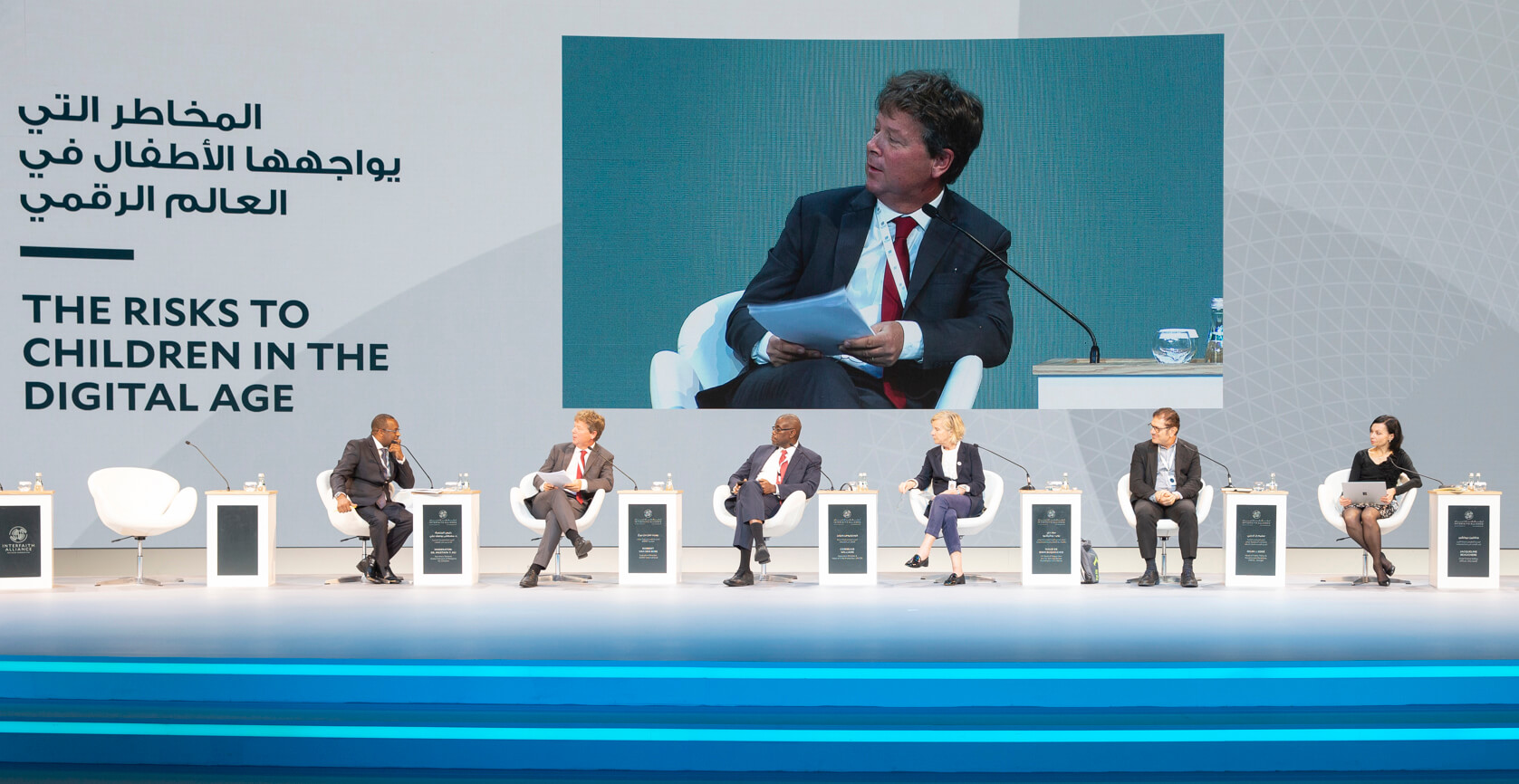Faith leaders from across the globe met in Abu Dhabi Nov. 19 and 20 to hear from and discuss with governments, civil society organizations and the technology industry, best practices for protecting children online, as well as new ways to work together to combat the sexual exploitation and abuse of young people in the digital age.
The United Arab Emirates sponsored the first Interfaith Alliance for Safer Communities Forum, which seeks to unite global religious leaders through a series of biannual forums and global workshops to foster dialogue and take action to address important social challenges, the first being the online sexual exploitation and abuse of children.
I spoke on the forum’s opening panel, which focused on online risks to children. Other participants included representatives from ECPAT International, UNICEF and Google, as well as Maud de Boer-Buquicchio, the U.N.’s Special Rapporteur on the sale and sexual exploitation of children. Our panel was moderated by Dr. Mustafa Y. Ali, Secretary General of the Global Network of Religions for Children. I also co-moderated with Howard Taylor, executive director of the Global Partnership to End Violence Against Children, a discussion workshop about partnering and collaborating across sectors and stakeholder groups to better protect children online.
Like the inaugural World Congress on Child Dignity in the Digital World held in Rome in October 2017, this follow-up forum focused on child sexual exploitation and abuse, and the online prevalence of child sexual abuse imagery. In the opening panel, however, we broadened the conversation to discuss the array of harms and abuse that youth may encounter online.
Understanding online risks to teens and young people
At Microsoft, we see online risks to all people as stemming from four primary sources, what I call the Four C’s: content, contact, conduct and commerce. In and of themselves, the Four C’s are fairly innocuous, but when we consider illegal content, inappropriate contact or conduct, or illegitimate commerce, we’re addressing online safety risks and harm. To better understand that landscape, three years ago we began conducting research into online pitfalls as the centerpiece of our work in promoting digital civility: leading and acting with empathy, respect, compassion and kindness in all online interactions.
I shared with the Abu Dhabi audience that we poll teens and adults in more than 20 countries and ask about their lifetime exposure to some 20 different online risks across four categories: behavioral, sexual, reputational and personal/intrusive. As with the two prior years’ research studies, full results of our latest survey will be made available on international Safer Internet Day 2019, Feb. 5. Our latest results show that teens in 22 countries are most susceptible to behavioral, sexual and personal/intrusive risks. Teens have more limited exposure to reputational harms. And, along with online risks come real-life consequences and pain.
New results from 2018 digital civility research
Our 2018 study finds that nearly three-quarters (71 percent) of the more than 11,000 teens and adults polled said they had experienced at least one consequence due to online-risk exposure. These included losing trust in other people either online or offline; becoming stressed or depressed; and losing sleep, money, a job or a friend. In a small number of instances, respondents said they even contemplated suicide. And, along with those consequences comes a certain degree of pain. Nearly eight in 10 (79 percent) of teens who had experienced an online risk said they’d suffered some degree of pain. Just under 30 percent characterized the pain as mild or moderate, while 22 percent said it was severe. Of that 22 percent, 8 percent said the pain was debilitating, such that they didn’t want to get up in the morning, get out of bed or go to school.
Concluding the panel, we discussed suggested actions for faith leaders, such as leveraging available awareness-raising tools and educational resources to better understand online issues; learning to recognize telltale signs of risks and harm stemming from, for example, online bullying or harassment, and potentially intervening as wise and trusted adults in a child’s life. Identifying child sexual exploitation and abuse would be more difficult, but all agreed that clergy and religious leaders need to be open and welcoming to assisting children and teens with any digital or real-world concern. Robbert van den Berg, executive director at the nongovernmental organization ECPAT International, also appearing on the panel, summed up for faith leaders any number of young people’s online struggles elegantly and succinctly, “Try to understand it; don’t deny it.”
Two decades of child online protection
Microsoft’s commitment to protecting children, and indeed all individuals, online dates back more than 20 years. We readily and willingly collaborate with individuals and groups that share our goal of safer online communities for children and disrupting the online spread of illegal material. Earlier this month, we hosted a cross-industry hackathon focused on developing a tool to identify and root out potential instances of child online grooming for sexual purposes. We are encouraged by the outcomes of the hackathon, which included not only a technical and an engineering track, but also teams examining the requisite legal and operational aspects of implementing such a technique. The hackathon was mentioned in several circles at the Abu Dhabi event.
As we and others continually note: No one entity or organization can tackle these weighty issues alone. They continue to require new, innovative approaches and, the integration of the faith sector as an informed and involved actor can only speed our collective progress for the world’s children.
For more information about the Interfaith Alliance, see their website. To learn more about Microsoft’s technological contributions to the fight against online child sexual exploitation and abuse, see this webpage, and for more about staying safer online generally, visit our website and resources page, as well as our digital civility webpage: www.microsoft.com/digitalcivility. You can also connect with us on Facebook and Twitter.
At the time of writing of this post, Jacqueline Beauchere’s title was Chief Online Safety Officer.

